Monday, January 6th 2020

Intel 2020 CES Conference: Live Blog
Intel is presenting its 2020 International CES address by CEO Bob Swan. The company pledges relentless innovation and adherence to Moore's Law to introduce new technology. This is a live-blog of the event.01:16 UTC: And that's a wrap on Intel's CES event. Not even a passing mention of Comet Lake desktop processor. They had time for athlete tracking but not their 10th gen mainstream desktop product-line. Intel has officially ceded this market to AMD!
01:10 UTC: Intel Unveils DG1, it's first discrete GPU in the mobile form-factor. Can work in tandem with iGPU.01:07 UTC: Xe iGPU doubles graphics performance vs. Gen11. Advancements in display- and media-capabilities and AI-assisted image quality enhancements that leverages DLBoost.01:00 UTC: Intel unveils "Tiger Lake" processors. Combines "Willow Cove" CPU cores with Xe iGPU, features Thunderbolt 4 and Wi-Fi 6.00:59 UTC: Intel "Horseshoe Bend": A large 17-inch foldable PC.00:57 UTC: Lenovo also uttered "Core Hybrid," possibly commercial name of Lakefield (x86 big.LITTLE).
00:54 UTC: Lenovo shows off Yoga Slim 7 and ThinkPad X1 Carbon, along with a new all-day device, a full-performance, 5G-capable, foldable-PC that weighs less than 1 kg.00:53 UTC: Project Athena extended to Google Chromebook ecosystem.
00:51 UTC: HP Dragonfly is a super-thin Project Athena laptop with a 360-degree hinge, powerful hardware, and made from recycled plastic from the ocean.00:46 UTC: Gregory Bryant of client-computing group takes stage.00:29 UTC: AI a $25 Billion opportunity by 2025. Shenoy details what Habana Labs acquisition means. Xeon Scalable processor is a solid foundation for AI, thanks to DLBoost and AVX-512.00:25 UTC: Intel and Netflix closer to deploying AV1 codec: a bandwidth-friendly codec for the streaming content leader. AV1 will roll out in 2020.00:22 UTC: Navin Shenoy (Enterprise computing head) takes stage.
00:17 UTC: Intel's self-driving car tech has advanced. Driving an autonomous vehicle across traffic in Jerusalem. AI is also helping the American Red Cross Society navigating a disaster-hit zone. AI analyzes satellite images to draw out roads and directions.00:08 UTC: Intel predicts an exponential growth of data up to 175 ZB by 2025, and on average, 7 devices per human being, all generating data.
01:10 UTC: Intel Unveils DG1, it's first discrete GPU in the mobile form-factor. Can work in tandem with iGPU.01:07 UTC: Xe iGPU doubles graphics performance vs. Gen11. Advancements in display- and media-capabilities and AI-assisted image quality enhancements that leverages DLBoost.01:00 UTC: Intel unveils "Tiger Lake" processors. Combines "Willow Cove" CPU cores with Xe iGPU, features Thunderbolt 4 and Wi-Fi 6.00:59 UTC: Intel "Horseshoe Bend": A large 17-inch foldable PC.00:57 UTC: Lenovo also uttered "Core Hybrid," possibly commercial name of Lakefield (x86 big.LITTLE).
00:54 UTC: Lenovo shows off Yoga Slim 7 and ThinkPad X1 Carbon, along with a new all-day device, a full-performance, 5G-capable, foldable-PC that weighs less than 1 kg.00:53 UTC: Project Athena extended to Google Chromebook ecosystem.
00:51 UTC: HP Dragonfly is a super-thin Project Athena laptop with a 360-degree hinge, powerful hardware, and made from recycled plastic from the ocean.00:46 UTC: Gregory Bryant of client-computing group takes stage.00:29 UTC: AI a $25 Billion opportunity by 2025. Shenoy details what Habana Labs acquisition means. Xeon Scalable processor is a solid foundation for AI, thanks to DLBoost and AVX-512.00:25 UTC: Intel and Netflix closer to deploying AV1 codec: a bandwidth-friendly codec for the streaming content leader. AV1 will roll out in 2020.00:22 UTC: Navin Shenoy (Enterprise computing head) takes stage.
00:17 UTC: Intel's self-driving car tech has advanced. Driving an autonomous vehicle across traffic in Jerusalem. AI is also helping the American Red Cross Society navigating a disaster-hit zone. AI analyzes satellite images to draw out roads and directions.00:08 UTC: Intel predicts an exponential growth of data up to 175 ZB by 2025, and on average, 7 devices per human being, all generating data.
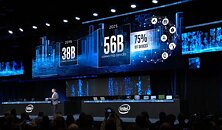

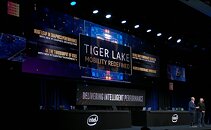
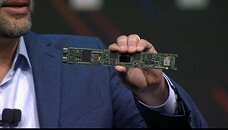

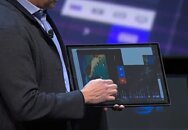

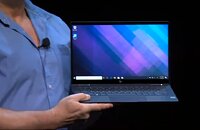
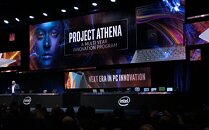
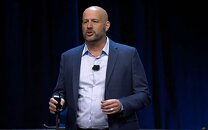
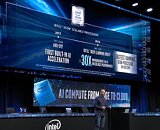
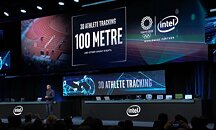
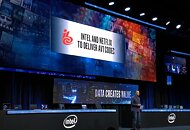
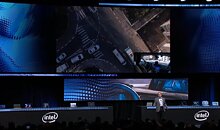

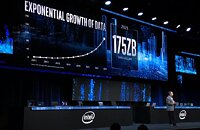
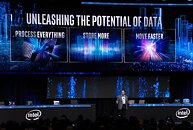

30 Comments on Intel 2020 CES Conference: Live Blog
I'll believe it when I see it.
Great, so it performs as well as a mid-tier GPU from any time in the last 8 years.
So bad that that there's no mention of any of the crappy * Lake CPUs, lol. This could be a record...
AMD showed 3 SoCs based on architectures we've known for months.
OK, this may not be as interesting for TPU community as AMD's keynote. It wasn't focused on gaming. It didn't tell us a lot about future desktops.
But don't you think you're slightly abusing the word "innovation"? :D
AMD was focused on product: they talked about 4800U/4800H, 5600XT and a bit about 3990X. That's it.
Intel focused on tech and features.
Seriously, what is not clear in chips made for laptops? You're aware of their existence, right?
That's how adults do it:
www.anandtech.com/show/15338/intel-ces-2020-keynote-live-blog-ice-comets-and-more-to-come
AI, autonomous cars, connectivity, AV1, new form factor (folding x86 tablets) and so on. If you're into tech, how could that not be interesting?
If you're just into gaming and cinebench, the other company did just that. So something for everyone.
I watched the whole AMD thing and was bored to death (and finished off by the stuttering presenter).
If I correctly recall consensus on this forum, the first Ryzen in 2017 already killed Intel. So Zen3 should change much, right? :)
Not only that but they have a really bad record of trying to make a dent in various industries. Food for thought.
They have some revenue targets and they need to tackle markets other than CPUs to meet them.
At the same time CPUs lost a lot of profit margin in the last 2 years (because of AMD's offensive) which means there's even more need to try something else.
Sure, not every endeavour worked for them, but some things definitely did.
You try 4 things, one sticks, you get rich. Business.
From your perspective, as a desktop user and a gamer, it would be best if Intel focused on desktop CPUs.
From my perspective, as a laptop user and a non-gamer, desktop CPUs hardly matter. I prefer how they push AI chips, Thunderbolt 4 and WiFi 6.
But from their perspective the goal is to make money. And they'll do whatever can lead to that. If trading bananas has more potential than making CPUs, they'll switch to trading bananas.
-Autonomous cars are at least a decade away from market readiness and regulatory approval. Besides, not all people have or want cars, let alone want them autonomous.
-AV1 is ... a video codec. Not quite keynote material, at least not by itself. It's a far smaller improvement than H.264 to H.265, and it's not like it's being announced alongside a dramatically improved encode/decode block or anything like that.
-New form factors are only relevant if a) they are real (as in not concept devices that never materialize), and b) have some actual utility to them. The Thinkpad X1 Fold looks very interesting, while Dell's two-screen XPS concept looks ...meh. Dual-screen, keyboardless laptops always prove to be less useful and less practical than people think. Inventing marginal use cases never makes for successful big-budget products, so the go-to idea must be improving on current use cases or increasing flexibility without sacrificing usefulness.a) You don't go to the Consumer Electronics Show to talk about your business plan. You go there to show your consumer electronics. At this point you're making excuses for them not having anything exciting to show off. WiFi 6 is not an Intel technology. TB4 is ... for now not a thing? It'll probably be good when it arrives, but I struggle to see how it will be more useful than TB3. And if it's more expensive than TB3, it'll be a dud.
b) What, exactly, are you going to be using "AI" for in your laptop? And how; what hardware will it be running on?
Yes, ML/AI is just about some "algorithms" - like everything we do on computers. If you don't know any use case, google will help you...Not everyone wants a desktop as well. I don't understand this argument...
Same with the "decade away". So what? We should wait for regulations and develop then? How would that evem work? :oImagine a situation where Netflix uses AV1 and only Intel has a hardware decoder. Youtube may be going for AV1 as well...
For these streaming companies making more efficient codecs is the primary way to save costs.And Intel's presentation was all about "consumer electronics", just from the tech point of view (not final products). AMD's presentation was mostly about gaming and occasionally about "creators". And just a small part of consumers does that.Most people associate AI with autonomous cars, robots, terminators etc. It's just not true. :)
Dell just announced XPS laptops will learn how you use them, to optimize your workflow over time. We'll see more and more applications like that.
So your laptop kind of "thinks". But it's not really "Skynet scenario", is it?
The "AI" umbrella term includes ML. And that's what I do most of the time (at work and as a hobby). I benefit from the ML boost libraries and ML accelerators.
As for "AI" itself, i.e. when the computer just decides how to do stuff - it's really nothing new. Photo/video editing software has been doing that for a long time. It's just that today we have chips and libraries that make this faster.
And there are many more possible uses.
Maybe virus scanners will benefit. Maybe some productivity software will get faster (it already does). Maybe my laptop will last longer on battery. It's all great.
There are some very tiny improvements that can be made, like pre-loading applications into memory if behavior is recognized that could be a precursor to using that application, but ... that's not going to make any kind of difference unless all you do every day is open and close slow-loading applications.Good for you. You belong to a tiny niche even within the PC enthusiast space, which is itself a tiny niche of humanity. For the rest of us, this has pretty much zero tangible benefit.Which is exactly what I was saying. They're trying to sell (slightly fancy) algorithms as something brand new and revolutionary, when the fact is that real-world improvements from this tech are ... tiny. Outside of datacenters and research, at least.
And there are many more possible uses.
Maybe virus scanners will benefit. Maybe some productivity software will get faster (it already does). Maybe my laptop will last longer on battery. It's all great.
[/QUOTE]
Sure, some stuff will get marginally faster, some stuff will get marginally better, and things will improve over time. I'm all for smarter battery management and similar systems, as most computer infrastructure is shockingly dumb in a lot of ways. But none of this is anything close to the revolutionary PR BS they are trying to sell it as. AI is not a new computing paradigm, it's just more of the same. Which is fine - what we already have is pretty frickin' cool. But slight improvements to various parts of it isn't going to revolutionize anything, so they should really stop saying that.